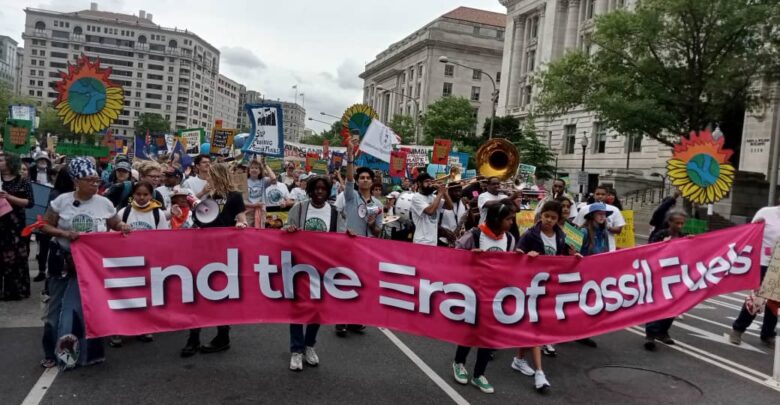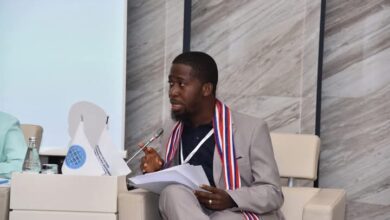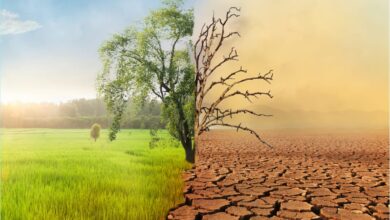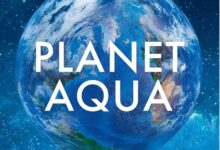
New research points to an ever-increasing collection of evidence that the human and environmental consequences of the project are dire, but still preventable
As the Africa Climate Summit gets underway this week, plans for the largest new oil infrastructure projects on the continent continue unabated, despite alarms from civil society, global observers and investors alike.
The East Africa Crude Oil export pipeline (EACOP) — a planned 1,443-kilometer pipeline from the Tilenga and Kingfisher oil fields on the shores of Lake Albert in Uganda to the port of Tanga in the Indian Ocean in Tanzania — poses massive threats to communities, and ecosystems from coral reefs, to some of the last remaining primary forests on Earth, to globally-important wetlands. Analysis shows the project threatens to produce 25 times the host nations’ combined annual emissions.
“The International Energy Agency (IEA) said in 2021 that in order to limit global warming to within the threshold of 1.5°C, no further fossil fuel expansion must take place. As the UN Secretary-General António Guterres said at the launch of the last Intergovernmental Panel on Climate Change (IPCC) report, ‘Fossil fuels are a dead end — for our planet, for humanity, and yes, for economies.’ The Ugandan, Tanzanian and Congolese governments must heed calls to stop the expansion of fossil fuels in the African Great Lakes region.” Says Ms. Hilda Nakabuye of Fridays for Future-Uganda
An assault on Murchison Falls National Park: Endangering the Upper Nile and its Wetlands
New maps and research (attached and below, in Enclosures) show an expanded view of the threats to communities and critical lands and waters. The project increases the risk to major lakes and rivers: including the Victoria Nile River or Upper Nile. New maps and analysis also show the expansion of oil wells into Murchison Falls National Park and Ramsar wetland of global importance — including a local pipeline across the Victoria Nile River and surrounding wetlands feeding into Lake Albert — and other areas in the Albertine rift, being built to supply EACOP.
“The maps show that Total is constructing seven of the ten wellpads that are to be located within Murchison Falls National Park. Two of the wellpads are too close to the Murchison Falls-Albert Delta Ramsar site. This is disheartening to see. So is seeing how large swathes in the park have been pockmarked by oil exploration wells, roads and other infrastructure. TotalEnergies often says that they are using a small part of the park but these new satellite images show that a combination of oil roads, bridges, oil feeder pipelines and wellpads could destroy Murchison Falls National Park forever. No well-meaning institution, including the Ugandan government, Ramsar Secretariat, financial institutions, export credit agencies and others should support TotalEnergies in its oil exploitation misadventures in our national park. The above institutions should call on TotalEnergies to invest in renewable energy instead of oil projects.” Says Ms. Patience Katusiime of the Environment Governance Institute in Uganda
EACOP’S ripple effect: Threats to tropical forests & Virunga in DRC
The first cut is the deepest in every fossil fuel project: pipelines beget more pipelines into increasingly sensitive and rare ecosystems. New maps also show that oil expansion in critical forests and protected areas in the Democratic Republic of Congo is be much more likely — if the EACOP project moves forward. Virunga National Park is an iconic protected area at risk — in addition to millions of hectares of tropical forests and thousands of communities in the DRC as detailed in-depth in a report titled Congo in the Crosshairs released at COP 27.
“Virunga National Park, which contains a Ramsar site and is also a UNESCO World Heritage Site, is an iconic protected area at risk in addition to millions of hectares of tropical forests under oil blocks because the DRC government has been emboldened by Uganda’s example. Because the world looks on as oil exploitation goes on in Murchison Falls National Park, the Congolese government also developed courage to put oil blocks covering Virunga up for exploration licensing in July 2022. Moreover, construction of the EACOP will make oil exploitation in the DRC Albertine Graben more viable. We want international bodies such as the Ramsar Secretariat to act. They must engage the Ugandan, Tanzanian and Congolese governments to stop any oil exploitation plans covering Ramsar sites. My fear is that this EACOP project will destabilize the socio-economic and social life of local communities, and will further encourage illegal migration to Europe.” Says Mr. Bantu Lukambo of Innovation pour le Développement et la Protection de l’Environnement (IDPE) in the DRC
Threats to coastal and marine life: Mangroves and protected areas
At the other end of the pipeline environmental and social risks are also prevalent as new maps illustrate. Along the Tanzanian shore, two important Ecologically or Biologically Significant Marine Areas (EBSAs) – the Pemba-Shimoni-Kisite site and the Tanga Coelacanth site – are at high risk from oil transport leaving Tanga Port. These EBSAs host several Marine Protected Areas, as well as Mangrove Forest Reserves. The Pemba-Shimoni-Kisite site is known for its coral reefs, as well as the endemic coconut crab (Birgus latro), the largest land-living arthropod.
“Along the Tanzanian shore, two important Ecologically or Biologically Significant Marine Areas (EBSAs) – the Pemba-Shimoni-Kisite site and the Tanga Coelacanth site – are at high risk from oil leaving the port at Tanga. These EBSAs host several Marine Protected Areas, as well as Mangrove Forest Reserves. The Pemba-Shimoni-Kisite site is known for its coral reefs, as well as the endemic coconut crab (Birgus latro), the largest land-living arthropod. These need to be protected.” Says Mr. Richard Sekondo of Organisation for Community Engagement (OCE) in Tanzania
Community impacts and rights violations
It is estimated that the project oilfields and pipeline will directly impact the land of at least 120,000 people. A 2021 legal complaint from communities affected in Uganda called the project’s ecological and human rights risks “so extreme and vast that they are unmanageable.” United Nations Special Rapporteurs on human rights defenders express their concerns regarding arrests, intimidation and judicial harassment of human rights defenders and civil society organizations working on issues related to the oil and gas sector in Uganda.
“We are worried about the high pollution risk that the Tilenga and EACOP projects pose to Ramsar wetlands in Uganda, Tanzania and the DRC. The Victoria Nile Crossing, which is within the boundaries of the Murchison Falls-Albert Delta Ramsar site, is particularly worrying. While TotalEnergies has promised to ensure biodiversity conservation amidst its oil exploitation activities covering Ramsar wetlands and other biodiverse areas, it is very difficult to believe them. In Uganda and Tanzania, they have been unable to manage impacts arising from their compulsory land acquisition processes for the Tilenga and EACOP projects. They have also been unable to manage the flooding as well as dust, noise and light pollution impacts seen because of the Tilenga project in Buliisa district in Uganda.” Says Mr Dickens Kamugisha of Africa Institute for Energy Governance (AFIEGO) in Uganda
Regional and international opposition
Local and global opposition to the oil projects has grown, despite an environment of fear and intimidation. Several legal challenges at the international, regional,and domestic levels have been initiated against the Tilenga, EACOP and refinery projects.
Despite documented harassment, local groups continue to campaign against the EACOP. African civil society and advocacy groups, the Africa Institute for Energy Governance (AFIEGO), the Centre for Food and Adequate Living Rights (CEFROHT), Natural Justice, and the Centre for Strategic Litigation are currently waiting for a decision from the East African Court of Justice on their 2020 challenge to the EACOP project.
As a result of local campaigns with international allies, last year the European Parliament passed a resolution that urged the EU and the international community to” exert maximum pressure on Ugandan and Tanzanian authorities, as well as the project promoters and stakeholders, to protect the environment and to put an end to the extractive activities in protected and sensitive ecosystems, including the shores of Lake Albert.” This year French and Ugandan civic groups filed a second lawsuit in France that accuses the company of violating the country’s “duty of vigilance” law. The complaint seeks compensation for six years of alleged land and food rights violations.
As a result of global campaigns targeting EACOP funding, as of June, 27 banks, including the African Development Bank, and 23 insurers have refused to back the project.
- Global outrage as Total starts oil drilling in Murchison Falls National Park
- East African CSOs are calling for an end to fossil fuel investment as the 10th East African Petroleum Conference and Exhibition 2023 kicks off
- Mounting Opposition to EACOP: New Finance Risk Update Highlights Risks for Banks and Insurers
Media contacts







